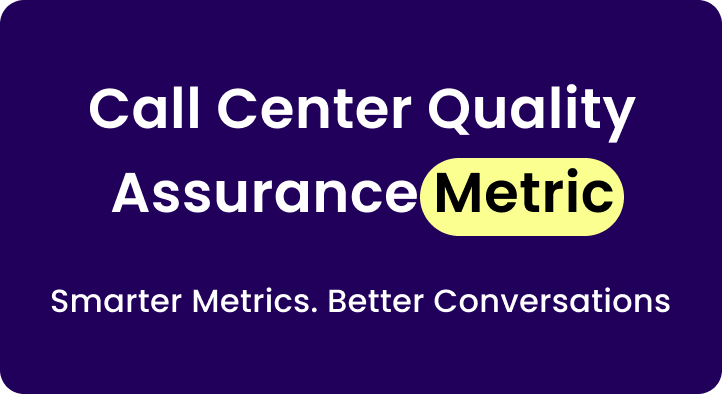74% of customers say just one bad experience is enough to make them switch brands.
In 2026, every customer call is a chance to win or lose loyalty. That’s why today’s agents need more than good manners.
They need a sharp mix of communication skills, emotional intelligence, product knowledge, and speed.
Call center skills are the abilities agents use to handle conversations effectively, whether over the phone, email, or live chat.
The goal? Solve problems fast, keep customers happy, and represent your brand like a pro.
In this article, you’ll discover:
- What are call center skills?
- What are the 13 must-have call center skills for agents?
Table of Contents
A. What are call center skills?
Call center skills are the abilities agents use to handle customer interactions smoothly. These include a mix of communication, empathy, problem-solving, and tech know-how.
Whether the conversation is inbound, outbound, or chat-based, these skills help agents stay calm, confident, and customer-focused.
They also include the ability to use tools like CRMs, follow scripts, and multitask under pressure. Strong call center skills make the difference between a frustrated caller and a satisfied one.
In short, these are the core traits that help agents deliver fast, friendly, and effective support, no matter the channel.
B. What are the 13 must-have call center skills for agents?
Here are the 13 essential skills every agent must master to deliver top-notch service, handle tricky situations, and keep customers coming back.
1. Communication Skills
Good communication is just sharing information clearly and really listening when a customer talks. It’s about making sure the person on the other end feels like you truly “get” them.
When you explain things in a way that is easy to follow:
- Problems get fixed faster.
- Customers trust you more.
- People don’t get frustrated by having to call back over and over.
Example:
Customer: “I’m really frustrated my order didn’t arrive on time.”
Agent: “I’m sorry for the delay. I see your order is expected tomorrow. Let me track it and update you right away.”
This shows active listening, empathy, and clear next steps.
✅ Tips to improve:
- Use simple, jargon-free language.
- Pause to confirm understanding.
- Speak calmly, even with upset callers.
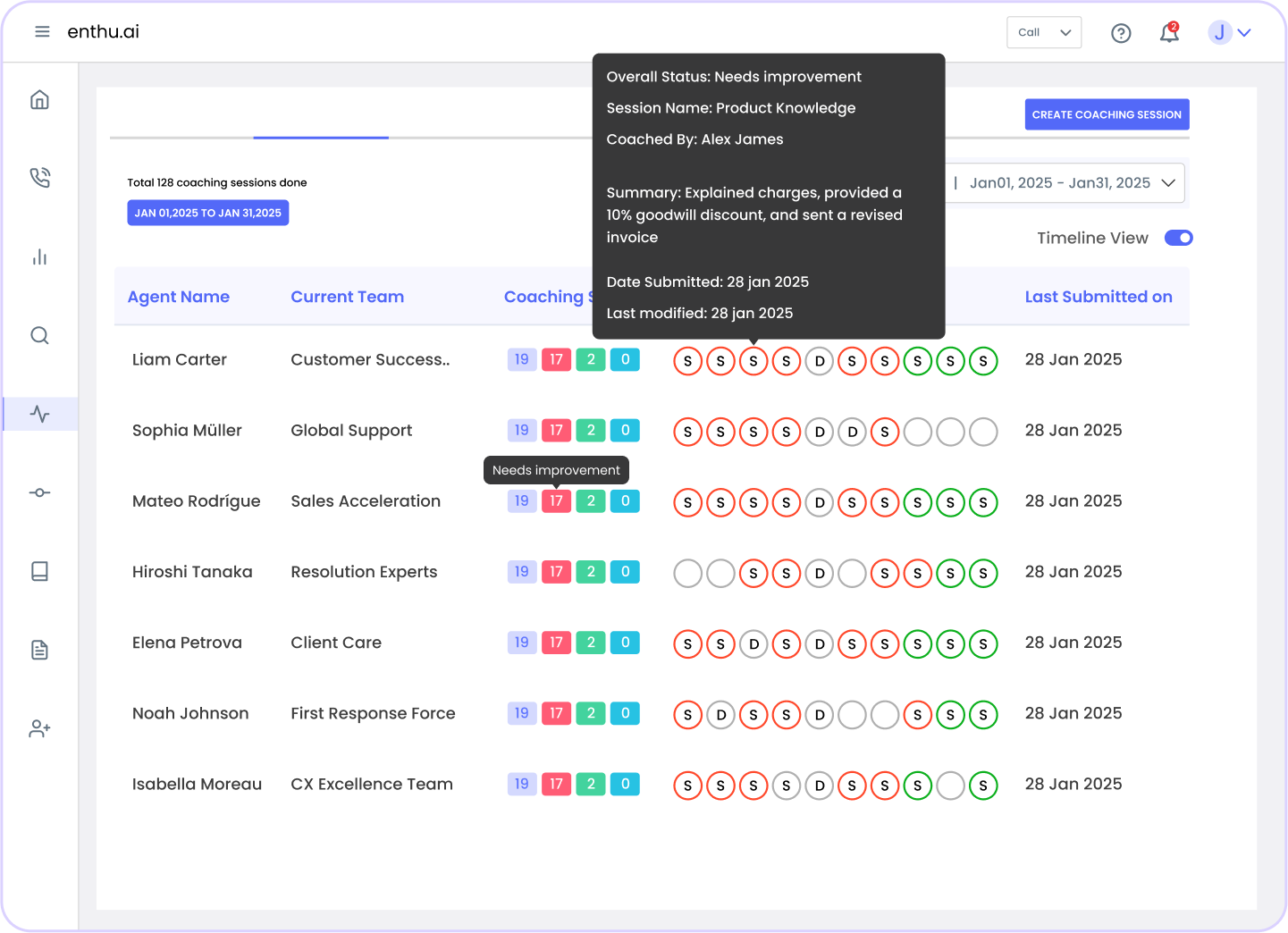
2. Empathy
When customers feel heard and cared for, they’re more likely to stay loyal even if problems arise.
Empathy means genuinely understanding and sharing the customer’s feelings.
It helps calm upset callers and builds a strong emotional connection, making customers feel valued.
Example:
Customer: “I’ve been on hold forever, and I’m so frustrated.”
Agent: “I completely understand how frustrating that wait can be. Thank you for your patience. I’m here now and ready to help.”
✅ Tips to improve:
- Listen fully before responding.
- Acknowledge the customer’s emotions.
- Use phrases like “I understand” or “I’m sorry you’re feeling this way.”
3. Problem-Solving
Strong problem-solving means identifying issues fast, thinking critically, and taking the right action without losing control of the call.
Great agents don’t just pass the problem to someone else; they own it and fix it.
Most customer calls are about problems, billing errors, login issues, and delays.
Agents who can solve these quickly create a better customer experience and reduce the need for escalations or repeat calls.
That saves time and improves satisfaction scores.
Example:
Customer: “My billing statement is showing an extra charge I didn’t authorize.”
Agent: “Let me pull up your account and review that charge. If it’s incorrect, I’ll fix it immediately or connect you with our billing specialist.”
This shows initiative, ownership, and a clear path toward resolution.
✅ Tips to improve:
- Stay calm, even when the problem is unclear.
- Ask clarifying questions to get to the root.
- Offer options, not just apologies.
4. Active Listening
Active listening means fully concentrating on what the customer is saying rather than just waiting for your turn to talk.
It involves listening with intention, picking up on tone and emotion, and responding thoughtfully.
When customers feel truly heard, they become more cooperative and trusting.
Active listening reduces misunderstandings, shortens call times, and makes agents sound more confident and caring.
Example
Customer: “I’ve explained this three times already, and no one is helping me.”
Agent: “I hear your frustration, and I’m really sorry you’ve had to repeat yourself. Let me review your past interactions so you don’t have to go over it again.”
The agent picks up on the emotion, responds with empathy, and takes steps to move forward.
✅ Tips to improve:
- Avoid interrupting the customer mid-sentence.
- Use phrases like “Just to make sure I understand…”
- Paraphrase what the customer said to confirm understanding.
- Take brief notes if needed to stay focused.
Coaching tip: During QA sessions, managers can highlight examples where active listening helped de-escalate a tough call.
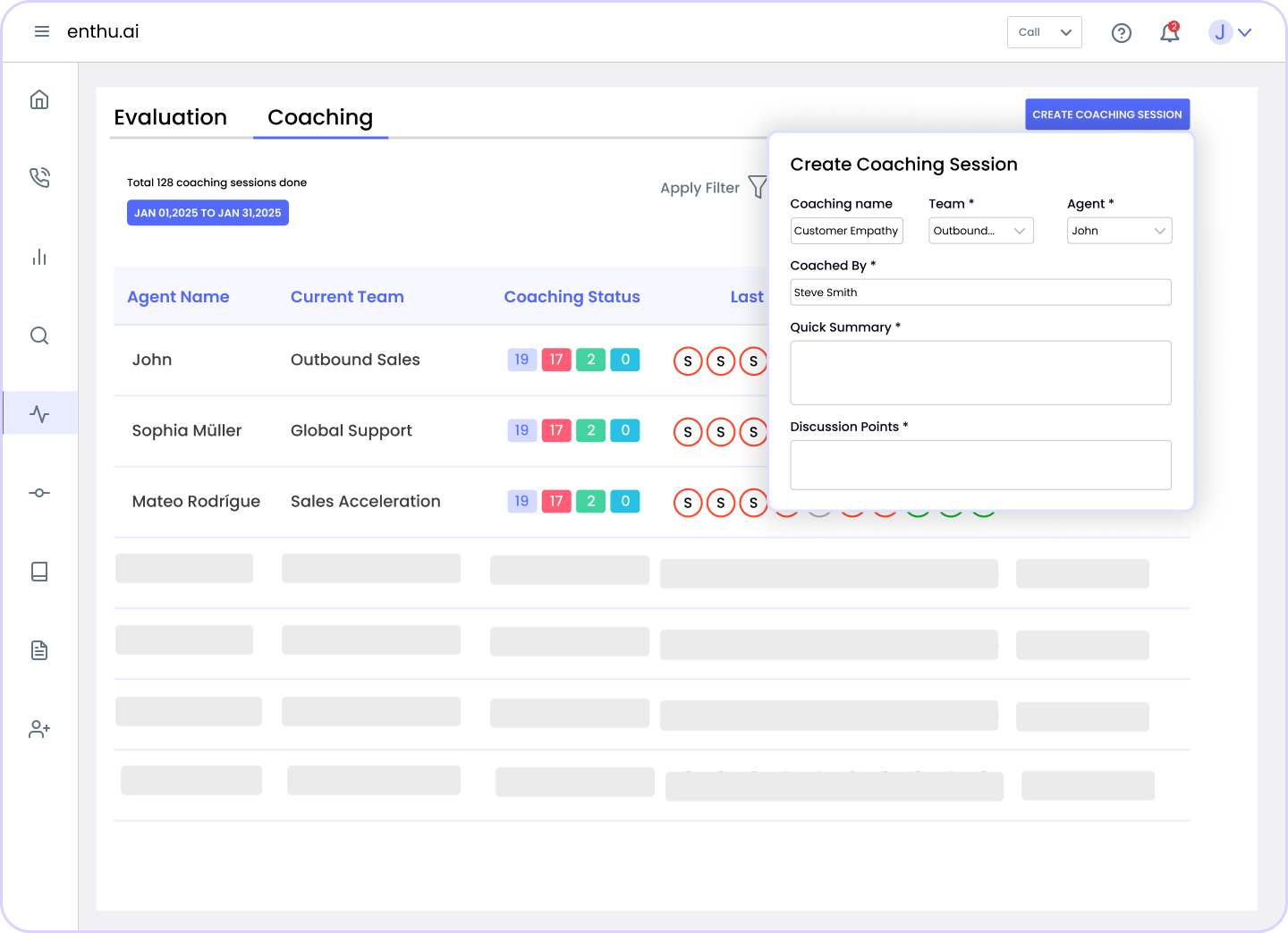
5. Call control
Call control is the ability to guide a conversation without sounding pushy or robotic.
It means keeping the call focused on resolving the issue while managing talkative or emotional customers with respect.
Without call control, conversations can go in circles.
It increases call duration, frustrates the agent, and may still leave the customer without a clear solution.
Skilled agents manage the flow while still being empathetic and polite.
Example:
Customer: “And then last week, something similar happened again. I was telling my neighbor about it…”
Agent: “I completely understand how ongoing issues like this can be frustrating. Let’s quickly check your account and get this fixed right now.”
The agent acknowledges the concern but redirects the conversation to the resolution.
✅ Tips to improve:
- Set the agenda early: “Let me ask a few quick questions so I can help better.”
- Use polite redirection: “Let’s get back to the issue you mentioned.”
- Keep responses short and focused.
- Avoid letting the customer dominate the call without progress.
Coaching idea: Role-play with agents using difficult customer types like talkers, ranters, or over-explainers to practice soft but firm redirection.
6. Technical proficiency
Technical proficiency means being comfortable with the tools, software, and systems needed to resolve customer issues efficiently.
Why it matters:
Agents often juggle CRMs, help desk platforms, call scripts, and more. A tech-savvy agent won’t fumble with systems or make customers repeat themselves.
Example
Customer: “Can you tell me the status of my last ticket?”
Agent: (instantly navigates to the support dashboard) “Yes, I see it was escalated yesterday and is currently under review.”
✅ Tips to improve:
- Get hands-on practice with all internal tools
- Learn common error codes or system shortcuts
- Stay updated with software changes or new features
Manager tip: Use weekly quizzes or micro-training to reinforce tool usage.
Download a Quiz template for free
1. You’re helping a customer while toggling between the CRM, help desk, and chat system. Suddenly, one tool crashes. What’s your best next step?
A. Restart the system silently while the customer waits
B. Inform the customer, offer a callback, and close the ticket
C. Let the customer know briefly, keep the conversation going, and use alternate tools if possible
D. Apologize, hang up, and notify your manager
Correct Answer: C
💡 Why? Transparency and adaptability keep trust intact while you troubleshoot.
2. A new CRM update changed the location of key customer fields. A customer is waiting. What do you do
A. Skip entering data for now and move on
B. Let the customer know you’re learning the update, and it may take longer
C. Try to explore and find the new layout as you talk
D. Quickly refer to the internal update notes or ping your team chat for the location
Correct Answer: D
💡 Why?: Leveraging internal documentation or peer help saves time and prevents visible fumbling.
3. You’re on a support call while backend servers are lagging, and you need to submit a form. How do you show control and maintain customer confidence?
A. “Our system’s down again… not sure what to do.”
B. “This will take longer than usual, sorry.”
C. “Looks like there’s a slight delay. I’m still on it and I’ll confirm once it’s submitted.”
D. “There’s a technical problem; let me escalate.”
Correct Answer: C
💡 Why?: Calm assurance shows confidence even when tech isn’t cooperating.
4. An agent logs a refund under the wrong account due to switching tabs too fast. How should they prevent this in the future?
A. Avoid switching tabs during live calls
B. Confirm account name/number aloud before submitting actions
C. Handle refunds only after the call ends
D. Ask QA to double-check every refund processed
Correct Answer: B
💡 Why? Verbal or visual confirmation reduces costly errors in multitasking environments.
5. You’re reviewing call logs and notice repeated delays in your tool navigation. What’s the best self-improvement strategy?
A. Ask to be assigned fewer calls
B. Blame the system’s slowness and move on
C. Request tool walkthrough sessions or shadow a faster peer
D. Skip documentation until you’re faster
Correct Answer: C
💡 Why?: Learning from high performers and practicing navigation builds speed and confidence.)
7. Emotional intelligence
Emotional intelligence (EQ) is the ability to understand, manage, and respond to both your own emotions and the customer’s feelings during a conversation.
High EQ helps agents stay calm under pressure, defuse tense situations, and show genuine empathy.
It builds trust faster and improves the overall customer experience.
Example
Customer (angry): “This is the third time I’ve had to call!”
Agent: “I can hear how frustrating that must be. Let’s fix this for good today.”
✅ Tips to improve:
- Practice active listening: pause before replying and acknowledge emotions
- Stay aware of your tone and language, especially during stressful calls
- Don’t take customer anger personally, focus on solving the issue
Manager tip: Use call recordings to highlight moments of great emotional control and empathy during team coaching.
8. Product Knowledge
Product knowledge means understanding your company’s offerings inside and out features, limitations, pricing, policies, and common customer pain points.
Why it matters:
Agents with strong product knowledge resolve issues faster, build customer confidence, and reduce the need for escalations.
Example:
Customer: “Does your subscription include international support?”
Agent: “Yes, our Pro Plan includes global phone and chat support, 24/7.”
✅ Tips to improve:
- Use flashcards or quick-reference guides for complex features
- Attend regular product update sessions or shadow product teams
- Document FAQs and tricky edge cases in a shared knowledge base
Bonus: Add mini “product knowledge sprints” in weekly huddles or gamify with monthly product trivia.
9. Adaptability
Adaptability is how quickly and smoothly an agent adjusts to changes, whether it’s new tools, tough customers, policy updates, or sudden call spikes.
Contact centers move fast. Agents who adapt easily stay calm, reduce errors, and maintain service quality even under pressure.
Example:
The company updates the refund policy mid-week, and a customer calls asking for the old terms.
Agent: “Thanks for bringing this up. Our policy changed recently, let me walk you through the new steps and see how we can make this work for you.”
✅ Tips to improve:
- Stay updated through internal comms or team huddles
- Ask clarifying questions when a change rolls out
- Take notes on how other agents handle unexpected situations
Bonus: Spotlight agents who handled last-minute changes well and share those calls in team coaching.
10. Attention to detail
Attention to detail means catching the small stuff like a mistyped account number, a misheard email address, or the exact steps in a process.
Small errors can lead to repeat calls, failed resolutions, or compliance issues.
Agents who notice the details help customers faster and avoid costly mistakes.
Example:
Customer: “My username is jon_smith92, with an underscore.”
Agent: “Got it, Jon underscore smith nine two. Let me repeat that just to make sure.”
✅ Tips to improve:
- Repeat critical info like email IDs or numbers back to the customer
- Use templates or checklists to avoid skipping steps
- Take notes during the call don’t rely on memory
Manager tip: Use QA scores to highlight patterns in missed details and coach with real examples.
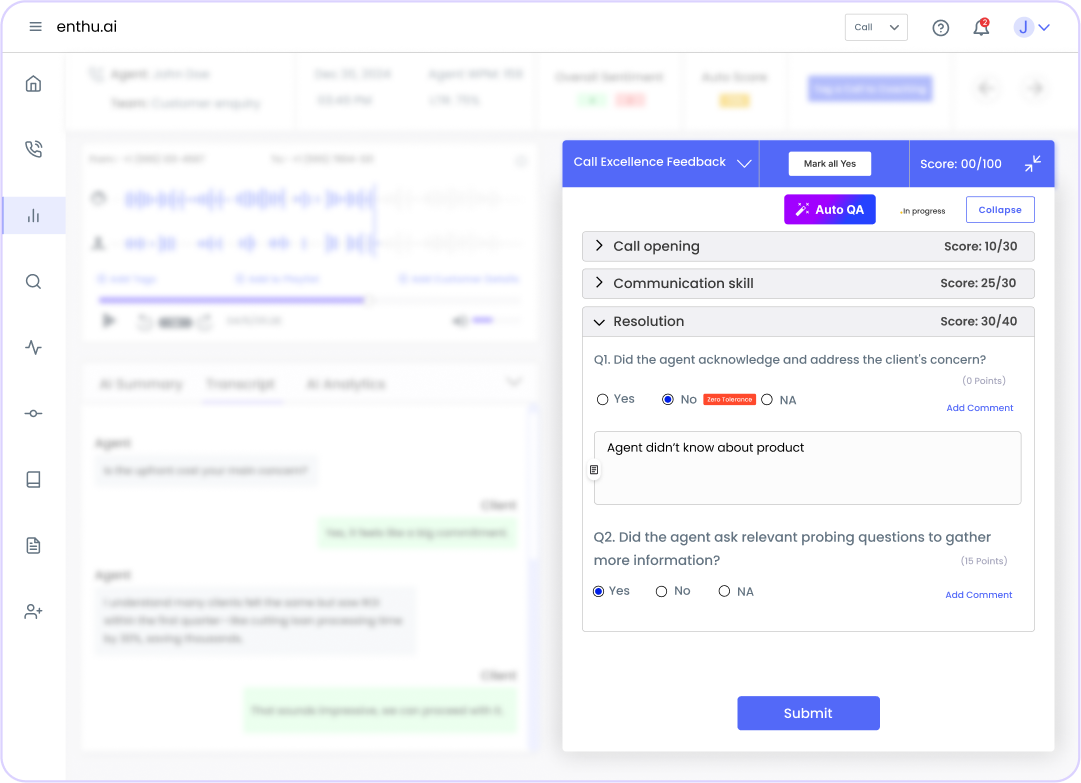
11. Time management
Time management means handling each call efficiently, resolving issues without rushing, but avoiding unnecessary delays. Good time management balances customer satisfaction and call center productivity, helping keep wait times down and customers happy.
Example:
Customer: “Can you explain your loyalty program?”
Agent: “Sure! I’ll cover the key benefits in two minutes so we can also address any questions you have after.”
✅ Tips to improve:
- Set clear goals for each call segment
- Use call scripts or guides to stay on track
- Prioritize urgent issues, but avoid multitasking that splits focus
Manager tip: Track average handle time and review longer calls for coaching opportunities.
12. Positive attitude
A positive attitude means staying upbeat and friendly, even during difficult calls or when facing frustrated customers.
Positivity helps calm upset callers, builds rapport, and creates a better experience for both customers and agents.
Example:
Customer: “I’m really frustrated with this delay!”
Agent: “I totally get how frustrating that is. Let’s see what we can do to fix this together.”
✅ Tips to improve:
- Smile while talking, it can be heard in your tone
- Use encouraging words like “definitely,” “happy to help,” and “great question.”
- Take short breaks to recharge and stay energized
Manager tip: Recognize agents who maintain positivity and share their calls as examples.
13. Multitasking
Multitasking is the ability to efficiently handle multiple tasks at once during a customer interaction.
Activities include listening actively, entering data, searching knowledge bases, and updating CRM systems – all while maintaining a smooth conversation.
Example:
During a call, a customer asks for a billing adjustment while also inquiring about an upcoming service upgrade.
The agent listens, updates billing, and explains upgrades – all without rushing the customer.
✅ Tips to improve:
- Practice keyboard shortcuts and CRM navigation to save time
- Develop note-taking habits that don’t interrupt conversation flow
- Use mental checklists to keep track of tasks during the call
- Train regularly with simulated calls to build confidence in handling multiple actions
- Prioritize tasks in real-time, focus first on immediate customer needs before administrative updates
Evaluation tip: Monitor call recordings to identify multitasking bottlenecks and provide targeted coaching. Encourage agents to share tips on workflow management during team meetings.
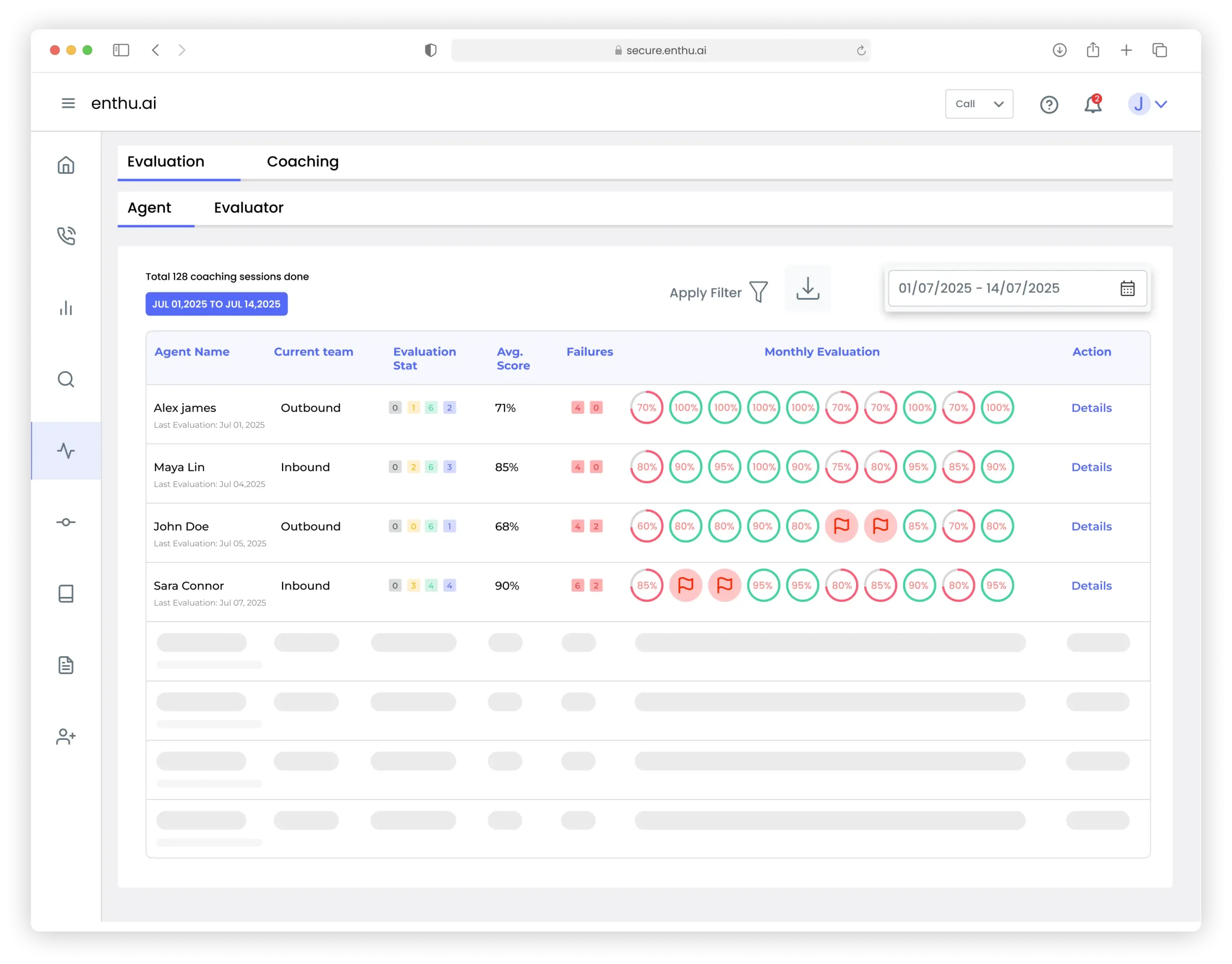
Call Center Agent Skills Self-Evaluation Checklist
Rate yourself on each skill from 1 to 5:
1 = Needs improvement | 3 = Competent | 5 = Expert
| Skill | Rating (1-5) | Comments / Examples from Your Calls |
| 1. Communication | ||
| 2. Active Listening | ||
| 3. Empathy | ||
| 4. Patience | ||
| 5. Problem-Solving | ||
| 6. Product Knowledge | ||
| 7. Call Control | ||
| 8. Adaptability | ||
| 9. Emotional Intelligence | ||
| 10. Attention to Detail | ||
| 11. Time Management | ||
| 12. Positive Attitude | ||
| 13. Multitasking | ||
| 14. Computer Skills | ||
| 15. Teamwork | ||
| 16. Stress Management | ||
| 17. Conflict Resolution |
How to use:
- Be honest and reflect on recent calls.
- Add brief notes or examples for each skill to track your progress.
- Use this checklist as a starting point to create personal goals.
- Share it with your coach or manager for feedback and development plans.
Conclusion
Success in the call center world today demands more than routine. It requires agents to continuously evolve and sharpen a diverse set of call center skills.
These 17 abilities form the foundation for agents to confidently handle any challenge, build trust, and create meaningful customer connections.
When your team masters these skills, they do not just solve problems.
They become the driving force behind customer loyalty and business growth.
Empower your agents to grow and watch your call center transform into a powerhouse of exceptional service.
FAQs
1. What are hard skills in a call center?
Hard skills in call center include computer skills, knowledge of CRM software, typing speed, active listening, problem-solving, sales and communication skills, and familiarity with products or services offered by the company.
2. What are soft skills in a call center?
Soft skills in a call center include empathy, patience, professionalism, adaptability, teamwork, conflict resolution, effective communication, and a positive attitude towards customers and colleagues.
3. What are the skills required for a call centre?
Call center skills include good communication, active listening, empathy, problem solving, multitasking, patience, time management, flexibility, and technical competency with CRM and call center software such as Enthu.AI.
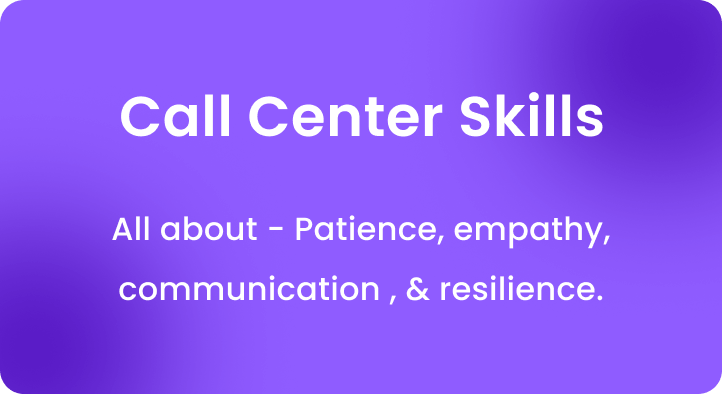



 On this page
On this page

